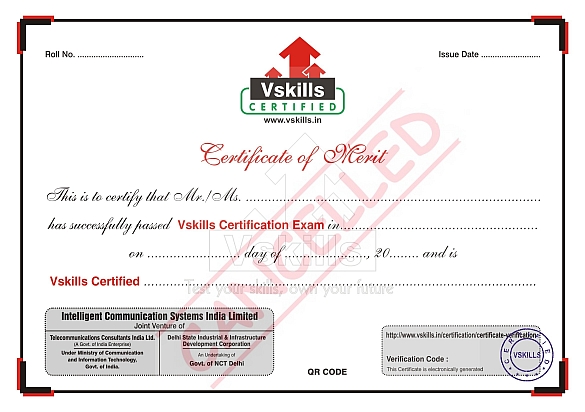- Duration / Course length: 1 To 2 Months Start now
- Certificates:
- Course delivery: This course is delivered in video format
Course details
Vskills certification for Tomcat Server Professional assesses the candidate as per the company’s need for managing and maintaining Tomcat Server for Java based applications. The certification tests the candidates on various areas in installation, configuration and deployment of Apache Tomcat server, realm configuration, SSL, SSI, JSP, JNDI, logging, classloading, CGI, balancer, clustering, virtual hosting, APR, monitoring and ;Why should one take this certification?
This certification is intended for professionals and graduates wanting to excel in their chosen areas. It is also well suited for those who are already working and would like to take certification for further career progression.
Earning Vskills Tomcat Server Professional Certification can help candidate differentiate in today's competitive job market, broaden their employment opportunities by displaying their advanced skills, and result in higher earning ;
Who will benefit from taking this certification?
Job seekers looking to find employment in software development or IT departments of various companies, students generally wanting to improve their skill set and make their CV stronger and existing employees looking for a better role can prove their employers the value of their skills through this ;
Table of Contents
Introduction
- Terminology
- Directories and Files
- Configuring Tomcat
- Where to Go for Help
- Introduction
- Windows
- Unix daemon
- Installation
- Deployment Organization
- Source Organization
- Development Processes
- Example Application
- Introduction
- Installation
- A word on Contexts
- Deployment on Tomcat startup
- Deploying on a running Tomcat server
- Deploying using the Tomcat Manager
- Deploying using the Client Deployer Package
- Introduction
- Configuring Manager Application Access
- Supported Manager Commands
- Executing Manager Commands With Ant
- Using the JMX Proxy Servlet
- Quick Start
- Overview
- Common Features
- Standard Realm Implementations
- Background
- Permissions
- Configuring Tomcat With A SecurityManager
- Configuring Package Protection in Tomcat
- Troubleshooting
- Introduction
- webxml configuration
- contextxml configuration
- Global configuration
- Using resources
- Tomcat Standard Resource Factories
- Adding Custom Resource Factories
- Introduction
- DriverManager, the service provider mechanism and memory leaks
- Database Connection Pool (DBCP) Configurations
- Non-DBCP Solutions
- Oracle i with OCI client
- Common Problems
- Overview
- Class Loader Definitions
- XML Parsers and Java
- Running under a security manager
- Introduction
- Configuration
- Known issues
- Production Configuration
- Web Application Compilation
- Optimisation
- Quick Start
- Introduction to SSL
- SSL and Tomcat
- Certificates
- General Tips on Running SSL
- Configuration
- Installing a Certificate from a Certificate Authority
- Troubleshooting
- Using the SSL for session tracking in your application
- Miscellaneous Tips and Bits
- Introduction
- Installation
- Servlet Configuration
- Filter Configuration
- Directives
- Variables
- Introduction
- Installation
- Configuration
- Introduction
- Apache Proxy Support
- Apache Proxy Support
- Introduction
- Adding MBean descriptions
- What is the DefaultServlet
- Where is it declared?
- What can I change?
- How do I customize directory listings?
- How do I secure directory listings?
- For the impatient
- Cluster Basics
- Overview
- Cluster Information
- Bind session after crash to failover node
- Configuration Example
- Cluster Architecture
- How it Works
- Monitoring your Cluster with JMX
- FAQ
- Using the JK x native connector
- Using Apache HTTP Server x with mod_proxy
- Introduction
- HTTP
- AJP
- Introduction
- Enabling JMX Remote
- Manage Tomcat with JMX remote Ant Tasks
- JMXAccessorOpenTask - JMX open connection task
- JMXAccessorGetTask: get attribute value Ant task
- JMXAccessorSetTask: set attribute value Ant task
- JMXAccessorInvokeTask: invoke MBean operation Ant task
- JMXAccessorQueryTask: query MBean Ant task
- JMXAccessorCreateTask: remote create MBean Ant task
- JMXAccessorUnregisterTask: remote unregister MBean Ant task
- JMXAccessorCondition: express condition
- JMXAccessorEqualsCondition: equals MBean Ant condition
- Using the JMXProxyServlet
- Introduction
- Using javautillogging (default)
- Using Logj
- Introduction
- Installation
- APR Components
- APR Lifecycle Listener Configuration
- APR Connectors Configuration
- Assumptions
- serverxml
- Webapps Directory
- Configuring Your Contexts
- Introduction
- Comet support
- Asynchronous writes
- Introduction
- Downloading
- Building
- Components list
- Using Tomcat libraries With Maven
- Introduction
- Non-Tomcat settings
- Default web applications
- Security manager
- serverxml
- System Properties
- webxml
- General
- Tomcat service application
- Tomcat monitor application
- Command line arguments
- Command line parameters
- Installing services
- Updating services
- Removing services
- Debugging services
- Multiple Instances
- Overview
- Built-in Tomcat support
- Third party libraries
- Reverse proxies
- Introduction
- use
- Attributes
- Advanced usage
- Code Example
- Building
- Overview
- Application development
- Tomcat WebSocket specific configuration





